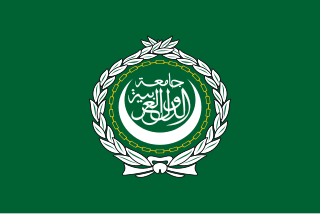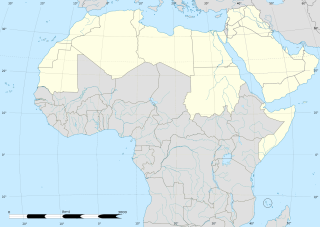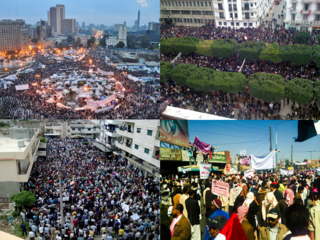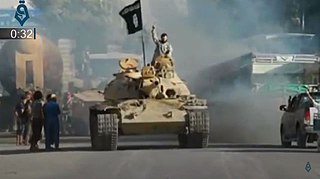Related Research Articles

The Arab League, formally the League of Arab States, is a regional organization in the Arab world, which is located in Africa and Western Asia. The Arab League was formed in Cairo on 22 March 1945 initially with six members: Egypt, Iraq, Transjordan, Lebanon, Saudi Arabia, and Syria. Yemen joined as a member on 5 May 1945. Currently, the League has 22 members, but Syria's participation has been suspended since November 2011.

The Arab world, also known as the Arab nation, the Arabsphere, or the Arab states, consists of the 22 Arab countries which are members of the Arab League. A majority of these countries are located in Western Asia, North Africa, and the Horn of Africa; the southernmost member, the Comoros, is an island country off the coast of East Africa. The region stretches from the Atlantic Ocean in the west to the Arabian Sea in the east, and from the Mediterranean Sea in the north to the Indian Ocean in the southeast. The eastern part of the Arab world is known as the Mashriq, and the western part as the Maghreb. Arabic is used as the lingua franca throughout the Arab world.

Alhurra is a United States-based public Arabic-language satellite TV channel that broadcasts news and current affairs programming to audiences in the Middle East and North Africa. Alhurra is operated by the Middle East Broadcasting Networks (MBN), which also operates Radio Sawa. Since July 2017, the president of MBN has been former US ambassador Alberto Fernandez.

Arabian culture is the culture of the Arabs, from the Atlantic Ocean in the west to the Arabian Sea in the east, and from the Mediterranean Sea in the north to the Horn of Africa and the Indian Ocean in the southeast. Language, literature, gastronomy, art, architecture, music, spirituality, philosophy, mysticism (etc.) are all part of the cultural heritage of the Arabs.
Arabic hip hop is hip hop music and culture originating in the Arabic-speaking world. It is performed in Arabic, English, French, Berber languages (Tamazight), and local Arabic dialects. Like most artists of the genre, the artists from the Arab world are highly influenced by American culture.
The mass media in Syria consists primarily of television, radio, Internet, film and print. The national language of Syria is Arabic but some publications and broadcasts are also available in English and French. While television is the most popular medium in Syria, the Internet has become a widely utilized vehicle to disseminate content. Transcending all available media, the government seeks to control what Syrians see by restricting coverage from outside sources. Publications and broadcasts are monitored by members of the government. Syria is ranked as one of the most dangerous places in the world for journalists. There were 28 journalists killed in combat in 2012.
Sherine Tadros is a British broadcaster who is the Head of New York (UN) Office at Amnesty International. She previously worked as a broadcast journalist, working for Sky News. She also previously worked for Al Jazeera English as the channel's correspondent in Gaza before working as an anchor based in Doha, Qatar.

Al Jazeera Media Network(AJMN) is a Qatari state-owned media conglomerate headquartered in Doha, Qatar. It is the parent company of Al Jazeera and its related networks. The chairman is Sheikh Hamad bin Thamer Al Thani. The acting director general is Mostefa Souag.

The Arab League has 22 member states. It was founded in Cairo in March 1945 with six members: the Kingdom of Egypt, Kingdom of Iraq, Lebanon, Saudi Arabia, Syrian Republic, and Transjordan. North Yemen joined on 5 May 1945. Membership increased during the second half of the 20th century. Five countries have observer status.

The Arab Spring was a series of anti-government protests, uprisings, and armed rebellions that spread across much of the Arab world in the early 2010s. It began in response to oppressive regimes and a low standard of living, starting with protests in Tunisia. From Tunisia, the protests then spread to five other countries: Libya, Egypt, Yemen, Syria and Bahrain, where either the ruler was deposed or major uprisings and social violence occurred including riots, civil wars or insurgencies. Sustained street demonstrations took place in Morocco, Iraq, Algeria, Iranian Khuzestan, Lebanon, Jordan, Kuwait, Oman,and Sudan. Minor protests in Djibouti, Mauritania, Palestine, Saudi Arabia, and the Moroccan-occupied Western Sahara. A major slogan of the demonstrators in the Arab world is ash-shaʻb yurīd isqāṭ an-niẓām.
Free speech in the media during the Libyan civil war describes the ability of domestic and international media to report news inside Libya free from interference and censorship during the civil war.

Ash-shaʻb yurīd isqāṭ an-niẓām is a political slogan associated with the Arab Spring. The slogan first emerged during the Tunisian Revolution. The chant echoed at Avenue Habib Bourguiba in Tunis for weeks. The slogan also became used frequently during the 2011 Egyptian revolution. It was the most frequent slogan, both in graffiti and in chants in rallies, during the revolution in Egypt.
The international reactions to the Arab Spring have been disparate, including calls for expanded liberties and civil rights in many authoritarian countries of the Middle East and North Africa in late 2010 and 2011.

Rassd News Network, also known by its initials of RNN, is an alternative media network based in Cairo, Egypt. RNN was launched as a Facebook-based news source launched on January 25, 2011. It quickly advanced to become a primary contributor of Egyptian revolution-related news that year. Applying the motto "From the people to the people," the citizen journalists who created RNN have since added a Twitter feed and launched an independent website dedicated to short news stories favored by an online audience.
Jadaliyya ("dialectic") is a free ezine founded in 2010. It features English, Arabic, French, and Spanish-language content by academics, journalists, activists, and artists from and/or on the Middle East and is produced by the Arab Studies Institute (ASI).

Elaph is the first daily Arabic independent online newspaper and is not associated with any established print or broadcast medium.

Women played a variety of roles in the Arab Spring, but its impact on women and their rights is unclear. The Arab Spring was a series of demonstrations, protests, and civil wars against authoritarian regimes that started in Tunisia and spread to much of the Arab world. The leaders of Tunisia, Egypt, Libya, and Yemen were overthrown; Bahrain has experienced sustained civil disorder, and the protests in Syria have become a civil war. Other Arab countries experienced protests as well.

The Arab Winter is a term for the resurgence of authoritarianism, absolute monarchies and Islamic extremism evolving in the aftermath of the Arab Spring protests in Arab countries. The term "Arab Winter" refers to the events across Arab League countries in the Mid-East and North Africa, including the Syrian Civil War, the Iraqi insurgency and the following civil war, the Egyptian Crisis, the Libyan Crisis and the Crisis in Yemen. Events referred to as the Arab Winter include those in Egypt that led to the removal of Mohamed Morsi and the seizure of power by General Abdel Fattah el-Sisi in an anti-Muslim Brotherhood campaign.

The role of social media in the "Arab Spring", a revolutionary wave of demonstrations and protests in the Middle East and North Africa between 2010 and 2012, remains a highly debated subject. Uprisings occurred in states regardless of their levels of Internet usage, with some states with high levels of Internet usage experiencing uprisings as well as states with low levels of Internet usage(such as Yemen and Libya). Thus sparking debate over the true nature of Social Media in the Arab Spring
Al Jazeera is a Qatari state-owned broadcaster based in Doha, Qatar, owned by the Al Jazeera Media Network. Initially launched as an Arabic news and current affairs satellite TV channel, Al Jazeera has since expanded into a network with several outlets, including the internet and specialty television channels in multiple languages.
References
- 1 2 3 Lister, Martin; Dovey, Jon; Giddings, Seth; Grant, Iain; Kelly, Kieran (2009). New Media: A Critical Introduction (PDF). New York: Routledge.
- 1 2 "Profile: Arab League". BBC News. BBC. Retrieved 18 April 2017.
- 1 2 3 4 Pintak, Lawrence; Ginges, Jeremy (2009-04-01). "Inside the Arab Newsroom". Journalism Studies. 10 (2): 157–177. doi:10.1080/14616700802337800. ISSN 1461-670X. S2CID 96478415.
- 1 2 3 4 Brown, Heather; Guskin, Emily; Mitchell, Amy (2012-11-28). "The Role of Social Media in the Arab Uprisings". Pew Research Center's Journalism Project. Retrieved 2017-04-18.
- 1 2 3 4 Armbrust, Walter (2012-07-01). "A History of New Media in the Arab Middle East". Journal for Cultural Research. 16 (2–3): 155–174. doi:10.1080/14797585.2012.647666. ISSN 1479-7585. S2CID 145391588.
- 1 2 3 4 Etling, Bruce; Kelly, John; Faris, Robert; Palfrey, John (2010-12-16). "Mapping the Arabic blogosphere: politics and dissent online". New Media & Society. 12 (8): 1225–1243. doi:10.1177/1461444810385096. S2CID 31532921.
- ↑ "Hillary Clinton: Al Jazeera 'Real news… instead of a million commercials'". www.adweek.com. Retrieved 2017-04-20.
- 1 2 3 4 Abdulla, Rasha A. (2007-01-01). The Internet in the Arab World: Egypt and Beyond. Peter Lang. ISBN 9780820486734.
- ↑ "10 Most Censored Countries - Committee to Protect Journalists". cpj.org. Retrieved 2017-04-20.
- 1 2 "The 'Arab Spring': Five years on". www.amnesty.org. Retrieved 2017-04-18.
- 1 2 3 4 ""Arab Culture": From Orientalist Construct to Arab Uprisings". Arab Media & Society. Archived from the original on 2017-08-23. Retrieved 2017-04-18.